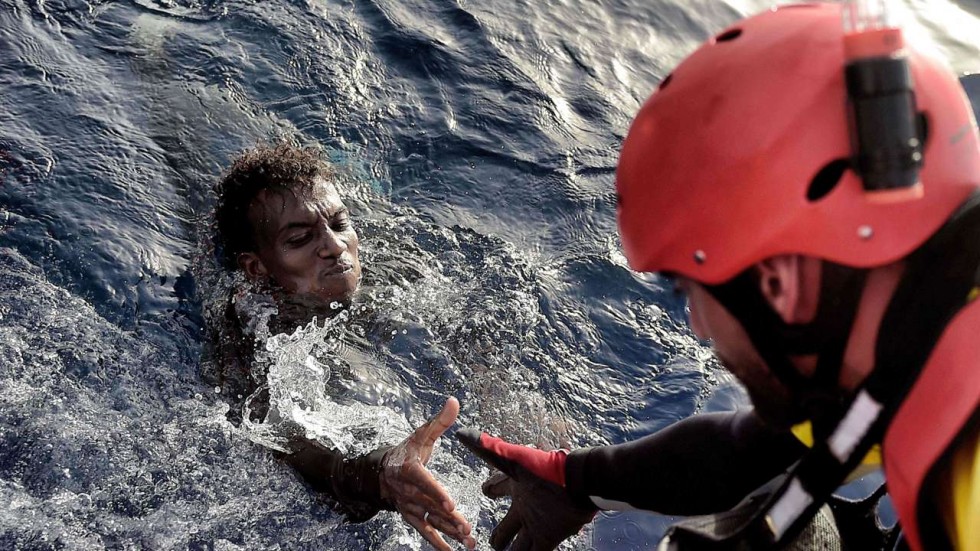A hand stretches from water and another from the side of a boat. A rare moment of purity in humanitarian work. The hands clasp, and a life is saved. It is far from coincidence that this purity flourishes on the open sea, in a space beyond the borders of states, a no-man’s non-land where, unaided, human survival can be counted in minutes.

We can be proud that there in the Mediterranean the humanitarian imperative to save lives defeats the savagery and oppression that force millions into a desperate displacement, defeats the policies of democratic nations that eliminate safe and legal alternatives for people to reach Europe and defeats the evil greed of the smugglers (misnomer alert!**). Those victories are, however, short-lived.
Last week search and rescue (SAR) operations pulled over 11,000 people from the sea, from boats so densely packed they recall the slave ships of centuries past. That is a spectacular number of hands. But the purity of search and rescue is a deceptive purity, one that masks costs borne by the humanitarian organizations engaged in SAR, by the fundamental principles and ideals of human rights and by the people pulled from the sea themselves. Because once that moment of purity has passed we leave the sea for land, where the humanitarian ethos collides with political reality, fear and gutless self-interest.
The image we have of rescue in the Mediterranean is a naïve one, for in fact the human quest for freedom and security and refuge often leads to the not-so-Hollywood ending of low-budget incarceration. From the sea and into the realm of mankind we might better append three Ds to SAR: Search and Rescue and Delivery into Detention and Deportation. Official containment policy propels this punitive approach, and research has shown the “highly detrimental impact of detention on the health of migrants and asylum-seekers”, not to mention the degradation (see this article in the excellent June 2016 issue of Refugee Survey Quarterly). SAR teams deal with consequences; they struggle with their inescapable complicity in the matter (see this analysis of MSF’s difficult and lengthy internal debate). As humanitarians they choose the life of those at sea over DDD, but they do not have to like that choice.
Humanitarian organizations and other activists alike have lifted their voices in protest, against the conditions and policies of detention, against the failure of our ideals and legal obligations to protect people in danger and against the human cost of political leadership’s deliberate failure to establish anything close to a functioning safe and legal alternative to reaching Europe. Those protests have not fallen on deaf ears, but they have fallen on ears that place political survival above principled commitment. From a different angle: their protest is drowned out by the protest of those more anti-immigration in persuasion. The Aylan Kurdi moments of overwhelming public compassion prove too brief to sustain policy. And almost cruelly, humanitarians must ponder their role in that as well, for the power of humanitarian purity renders much else invisible. In this case, the mediatique drama of the rescue at sea obscures both the prologue and the epilogue.
** What does sending thousands of people into the sea on unseaworthy boats have to do with smuggling? What are the smugglers concealing and conveying? They aren’t even on the boats any longer. This is not smuggling. This is mass murder.
Still believe the only answer that will survive the politics is carve out a whole new city in some sparsely populated country (Namibia or Botswana; less attractive: Guyana or Suriname) with a massive amount of funding and organization/police support from the EU. The refugees can build, literally, a whole new life with the protection of a European (Anglo-Saxon?) rule of law. The host country will benefit from a huge boost to their economy which would quickly propel them to upper-middle income status. If I were Ian Khama I would hit this bid in a nano-second. His oasis of civility is in a nasty (getting nastier) neighborhood and diamonds aren’t forever.
What you’re describing was the ‘easy answer’ the British proposed for Jewish refugees in what has become Israel, creating its own horrorshow of displacement. There is no empty land to stick refugees you don’t want. There is no alternative solution. The rich world must accept the humanity on its shore and do everything to support the people who have not left and wish not to leave. There are only human and political solutions: they cost money and empathy.